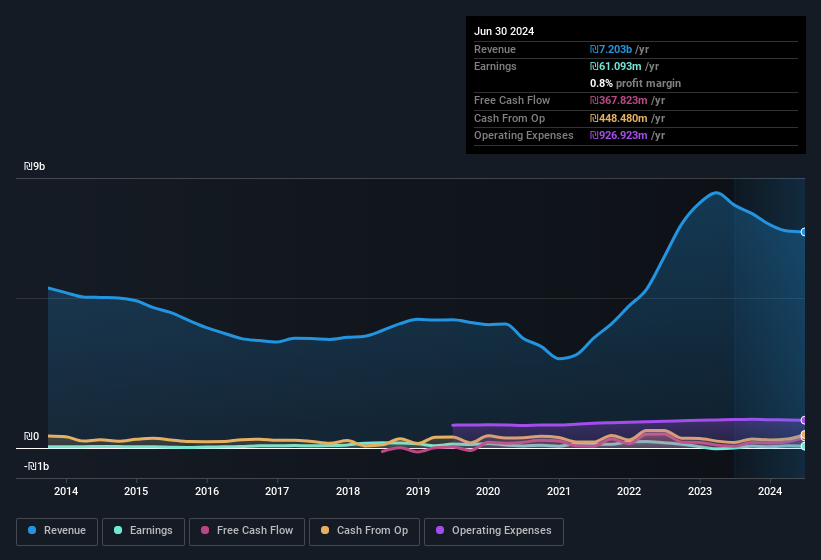- Israel
- /
- Specialty Stores
- /
- TASE:DRAL
Dor Alon Energy In Israel (1988)'s (TLV:DRAL) Earnings Seem To Be Promising

Dor Alon Energy In Israel (1988) Ltd's (TLV:DRAL) recent earnings report didn't offer any surprises, with the shares unchanged over the last week. We did some analysis to find out why and believe that investors might be missing some encouraging factors contained in the earnings.
View our latest analysis for Dor Alon Energy In Israel (1988)

Examining Cashflow Against Dor Alon Energy In Israel (1988)'s Earnings
As finance nerds would already know, the accrual ratio from cashflow is a key measure for assessing how well a company's free cash flow (FCF) matches its profit. To get the accrual ratio we first subtract FCF from profit for a period, and then divide that number by the average operating assets for the period. The ratio shows us how much a company's profit exceeds its FCF.
That means a negative accrual ratio is a good thing, because it shows that the company is bringing in more free cash flow than its profit would suggest. While it's not a problem to have a positive accrual ratio, indicating a certain level of non-cash profits, a high accrual ratio is arguably a bad thing, because it indicates paper profits are not matched by cash flow. Notably, there is some academic evidence that suggests that a high accrual ratio is a bad sign for near-term profits, generally speaking.
Dor Alon Energy In Israel (1988) has an accrual ratio of -0.11 for the year to June 2024. That indicates that its free cash flow was a fair bit more than its statutory profit. In fact, it had free cash flow of ₪368m in the last year, which was a lot more than its statutory profit of ₪61.1m. Dor Alon Energy In Israel (1988)'s free cash flow improved over the last year, which is generally good to see.
Note: we always recommend investors check balance sheet strength. Click here to be taken to our balance sheet analysis of Dor Alon Energy In Israel (1988).
Our Take On Dor Alon Energy In Israel (1988)'s Profit Performance
Dor Alon Energy In Israel (1988)'s accrual ratio is solid, and indicates strong free cash flow, as we discussed, above. Based on this observation, we consider it likely that Dor Alon Energy In Israel (1988)'s statutory profit actually understates its earnings potential! And it's also positive that the company showed enough improvement to book a profit this year, after losing money last year. Of course, we've only just scratched the surface when it comes to analysing its earnings; one could also consider margins, forecast growth, and return on investment, among other factors. So while earnings quality is important, it's equally important to consider the risks facing Dor Alon Energy In Israel (1988) at this point in time. Our analysis shows 3 warning signs for Dor Alon Energy In Israel (1988) (2 are a bit unpleasant!) and we strongly recommend you look at these before investing.
This note has only looked at a single factor that sheds light on the nature of Dor Alon Energy In Israel (1988)'s profit. But there is always more to discover if you are capable of focussing your mind on minutiae. For example, many people consider a high return on equity as an indication of favorable business economics, while others like to 'follow the money' and search out stocks that insiders are buying. So you may wish to see this free collection of companies boasting high return on equity, or this list of stocks with high insider ownership.
New: Manage All Your Stock Portfolios in One Place
We've created the ultimate portfolio companion for stock investors, and it's free.
• Connect an unlimited number of Portfolios and see your total in one currency
• Be alerted to new Warning Signs or Risks via email or mobile
• Track the Fair Value of your stocks
Have feedback on this article? Concerned about the content? Get in touch with us directly. Alternatively, email editorial-team (at) simplywallst.com.
This article by Simply Wall St is general in nature. We provide commentary based on historical data and analyst forecasts only using an unbiased methodology and our articles are not intended to be financial advice. It does not constitute a recommendation to buy or sell any stock, and does not take account of your objectives, or your financial situation. We aim to bring you long-term focused analysis driven by fundamental data. Note that our analysis may not factor in the latest price-sensitive company announcements or qualitative material. Simply Wall St has no position in any stocks mentioned.
About TASE:DRAL
Dor Alon Energy In Israel (1988)
Develops, constructs, and operates fueling complexes and commercial centers in Israel.
Proven track record and fair value.
Similar Companies
Market Insights
Community Narratives



